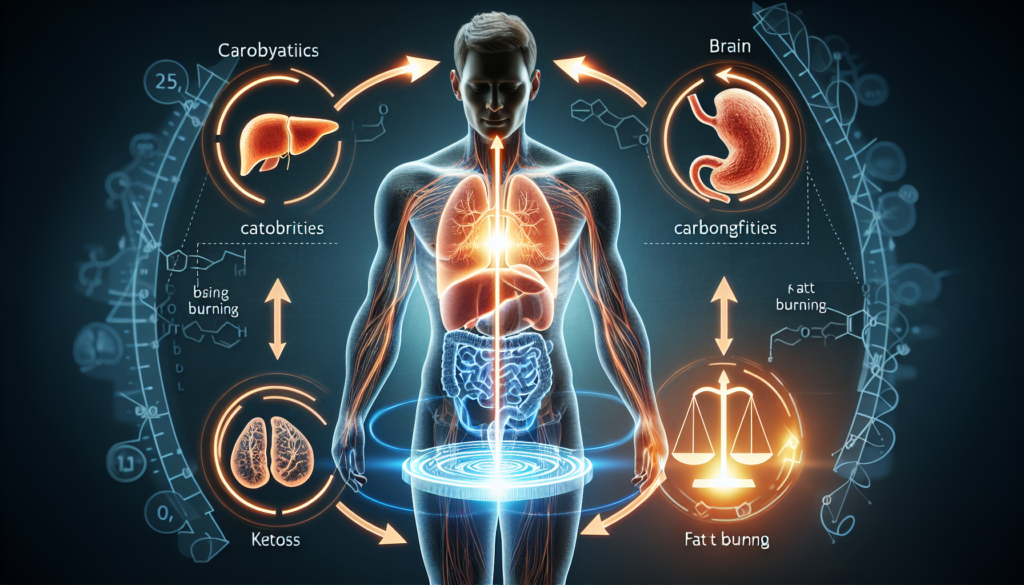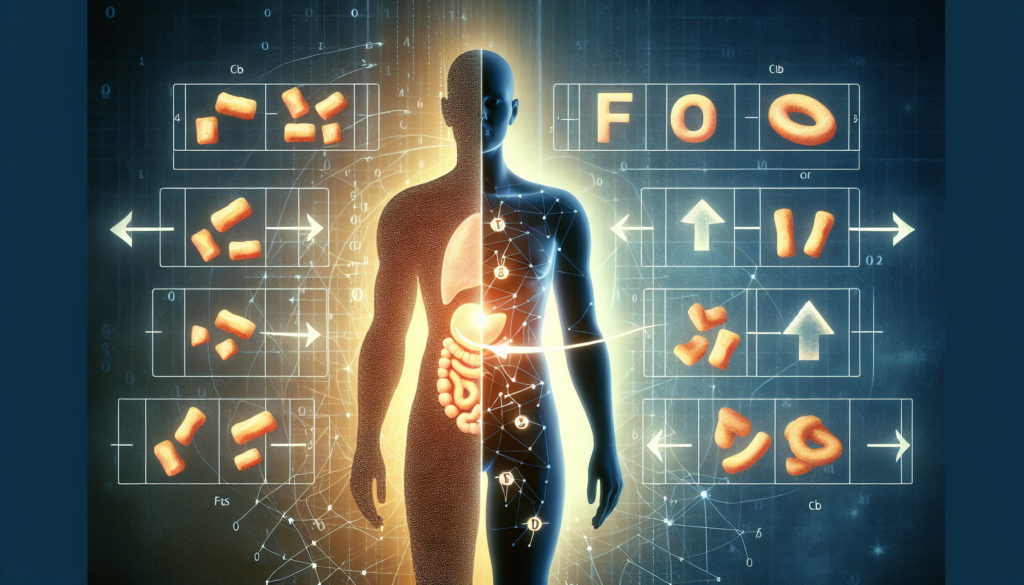Have you ever wondered about the science behind ketosis? In this article, you will explore the fascinating world of ketosis and its impact on the body. Ketosis, a metabolic process that occurs when the body doesn’t have enough carbohydrates to burn for energy, shifts to burning fat instead. Discover how this state can aid weight loss, provide mental clarity, and enhance athletic performance. Get ready to uncover the mysteries behind ketosis and its potential benefits!

What is Ketosis?
Definition of ketosis
Ketosis is a metabolic state in which the body shifts from using carbohydrates as its primary source of energy to utilizing ketones, which are produced from fat. During ketosis, the liver converts fats into ketone bodies, which serve as an alternative fuel source for the body.
How the body enters ketosis
The body enters ketosis when carbohydrate intake is significantly reduced or when fasting for an extended period. With limited glucose from carbohydrates, the body turns to fat stores to meet its energy needs. The liver breaks down these stored fats into ketone bodies, which are then utilized by the brain, muscles, and other tissues for fuel.
Difference between nutritional ketosis and ketoacidosis
While both nutritional ketosis and ketoacidosis involve the production of ketones, they are distinct states with different implications for health. Nutritional ketosis is a natural metabolic process that can be achieved through a low-carbohydrate, high-fat diet or intermittent fasting. It is a safe and regulated state, where ketone production remains within normal limits.
On the other hand, ketoacidosis is a serious and potentially life-threatening condition that occurs in individuals with uncontrolled diabetes. It is characterized by extremely high levels of ketones in the blood, which cause blood pH to become acidic. Ketoacidosis requires immediate medical attention and typically occurs when there is a lack of insulin in the body, leading to uncontrolled ketone production.
How Does Ketosis Work?
The role of carbohydrates in ketosis
Carbohydrates are the body’s primary source of glucose, which is used for energy. When carbohydrate intake is reduced, blood glucose levels decrease, signaling the body to start utilizing alternative fuel sources. In the absence of carbohydrates, the liver begins to convert stored fats into ketones, which can be used by various cells in the body for energy.
Body’s switch to fat metabolism
When carbohydrates are limited, the body undergoes a metabolic shift from relying on glucose for energy to utilizing fats. This switch occurs because the body adapts to the reduced availability of glucose and starts breaking down stored fats into fatty acids. These fatty acids are then converted into ketone bodies by the liver, which can be used as an energy source by various tissues, including the brain.
Production of ketone bodies
Ketone bodies, such as acetoacetate, beta-hydroxybutyrate, and acetone, are produced during ketosis. The liver breaks down fatty acids into these ketone bodies, which are released into the bloodstream. Ketone bodies can cross the blood-brain barrier and serve as a significant source of fuel for the brain. Additionally, muscles and other tissues can also utilize ketone bodies for energy during ketosis.
Energy production in ketosis
In ketosis, the body primarily relies on ketones for energy production instead of glucose. Ketones are metabolized in the mitochondria of cells through a process known as beta-oxidation. This process leads to the production of adenosine triphosphate (ATP), which is the body’s main energy currency. As a result, ketosis enables efficient energy production using fat stores, which can be beneficial for weight loss and overall well-being.
Benefits of Ketosis
Weight loss
One of the primary benefits of ketosis is its potential for promoting weight loss. When the body is in ketosis, it efficiently burns stored fat for energy. This can lead to a reduction in body fat and overall weight loss. Additionally, ketosis can help control appetite and reduce cravings, making it easier to adhere to a calorie-restricted diet.
Improved insulin sensitivity
Ketosis has been shown to improve insulin sensitivity, which is crucial for individuals with conditions like type 2 diabetes or insulin resistance. When the body is in a state of ketosis, it requires less insulin to transport glucose into cells. This can help regulate blood sugar levels and improve glycemic control.
Increased energy levels
Many individuals report increased energy levels and improved stamina when in ketosis. This is likely due to the more stable blood sugar levels and a consistent supply of energy from ketones. Unlike glucose, which can cause energy crashes after a meal, ketones provide a steady source of fuel that can enhance physical performance and mental focus.
Enhanced mental clarity
In addition to increased energy levels, ketosis may also improve mental clarity and cognitive function. Ketones are a preferred fuel source for the brain, and some studies suggest that ketosis can enhance mental performance, focus, and concentration.
Reduced inflammation
Chronic inflammation is associated with various diseases, including metabolic syndrome, cardiovascular disease, and neurodegenerative disorders. Ketosis has been shown to reduce inflammation markers in the body, potentially contributing to improved overall health and a decreased risk of chronic disease.
Potential therapeutic effects
Beyond the aforementioned benefits, ketosis has shown promise in various therapeutic applications. Research suggests that ketosis may help manage epilepsy and seizures, reduce symptoms of Alzheimer’s disease and Parkinson’s disease, and even improve outcomes in certain types of cancer. However, further research is required to fully understand the therapeutic potential of ketosis in these areas.
Nutritional Considerations for Ketosis
Macronutrient ratios in ketosis
Following a ketogenic diet involves consuming specific macronutrient ratios. This typically includes a high fat intake (70-75% of calories), a moderate protein intake (20-25% of calories), and a low carbohydrate intake (5-10% of calories). These ratios are designed to facilitate the production of ketones and maintain a state of ketosis.
Types of food allowed in a ketogenic diet
A ketogenic diet primarily consists of foods that are high in healthy fats and low in carbohydrates. Examples of foods typically included in a ketogenic diet are meats, fish, eggs, avocados, nuts and seeds, full-fat dairy products, and low-carbohydrate vegetables. It is important to avoid foods that are high in carbohydrates, such as grains, sugar, and starchy vegetables, as they can disrupt ketosis.
Importance of adequate hydration
When following a ketogenic diet, it is essential to maintain adequate hydration. The body excretes more water and electrolytes during ketosis, which can lead to dehydration if not properly addressed. Drinking enough water and replenishing electrolytes, such as sodium, potassium, and magnesium, can help prevent dehydration and maintain electrolyte balance.
Potential nutrient deficiencies
Due to the restrictions on carbohydrates, a ketogenic diet may limit the intake of certain nutrients found in high-carbohydrate foods. For example, whole grains provide essential vitamins and minerals, and fruits offer a range of beneficial antioxidants. Therefore, individuals following a ketogenic diet should be mindful of potential nutrient deficiencies and consider supplementation or careful meal planning to address these concerns.

Health Effects of Ketosis
Effects on brain function
Ketosis has been shown to have positive effects on brain function, particularly in the areas of cognitive function and neurological disorders. Ketones can provide an alternative fuel source for the brain, potentially improving mental clarity, focus, and memory. Additionally, ketosis has shown promise in managing conditions like Alzheimer’s disease, Parkinson’s disease, and epilepsy.
Impact on metabolic health
Metabolic health refers to the overall state of the body’s metabolism and its ability to maintain balanced blood sugar levels, regulate hormones, and efficiently burn energy. Ketosis can have beneficial effects on metabolic health by improving insulin sensitivity, reducing blood sugar levels, and promoting weight loss. These factors can contribute to a lower risk of conditions such as type 2 diabetes, metabolic syndrome, and cardiovascular disease.
Role in managing epilepsy and seizures
Ketogenic diets have been used for decades as a therapeutic treatment for epilepsy, particularly in children who do not respond well to medication. The high fat and low carbohydrate nature of the ketogenic diet helps to control seizures, although the exact mechanisms are not fully understood. Ketosis is believed to modulate brain activity, stabilize electrical signals, and provide an alternative fuel source for brain cells, reducing the occurrence and severity of seizures.
Potential benefits for neurodegenerative diseases
Emerging evidence suggests that ketosis may have a protective effect against neurodegenerative diseases, including Alzheimer’s and Parkinson’s disease. Ketones may provide an alternative energy source for brain cells, reducing the reliance on glucose metabolism, which is impaired in these conditions. Ketosis has also been shown to reduce inflammation in the brain, which may further contribute to its potential neuroprotective effects.
How to Achieve Ketosis
Following a ketogenic diet
The most common and effective way to achieve ketosis is by following a ketogenic diet, which involves significantly reducing carbohydrate intake and increasing fat consumption. Ideally, carbohydrates should be limited to around 20-50 grams per day, while healthy fats should make up the majority of daily calories. Protein intake should be moderate to avoid excessive gluconeogenesis, a process where protein is converted into glucose.
Intermittent fasting
Intermittent fasting is another method that can help induce and maintain ketosis. By restricting the time window in which you eat, such as adopting a 16:8 fasting schedule (16 hours of fasting, 8 hours of eating), the body depletes its glycogen stores and transitions into utilizing ketones for energy. Combining intermittent fasting with a ketogenic diet can further enhance the benefits of ketosis.
Supplements and exogenous ketones
Supplements and exogenous ketones can be used to support and enhance ketosis. Medium-chain triglyceride (MCT) oil, for example, is often consumed to increase ketone production. MCTs are quickly metabolized by the liver and converted into ketones, providing a readily available source of fuel. Exogenous ketone supplements are also available in powder or liquid form, which can help boost ketone levels and provide an additional energy source.
Exercise and physical activity
Engaging in regular exercise and physical activity can be beneficial for entering and maintaining ketosis. Exercise depletes glycogen stores, increasing the body’s need to utilize fats for energy. This can help accelerate the transition into ketosis. Additionally, consistent physical activity can improve overall metabolic health, enhance weight loss, and support the maintenance of ketosis.
Side Effects and Risks
Keto flu
Some individuals may experience side effects when initially transitioning into ketosis, commonly referred to as the “keto flu.” Symptoms may include fatigue, headaches, nausea, dizziness, and irritability. These side effects are typically temporary and can be alleviated by staying properly hydrated, ensuring adequate electrolyte intake, and gradually easing into the ketogenic diet.
Increased urine output and electrolyte imbalances
When in ketosis, the body excretes more water and electrolytes through increased urine output. This can potentially lead to dehydration and electrolyte imbalances if not carefully managed. It is important to drink enough water, replenish electrolytes through diet or supplementation, and be attentive to any signs of dehydration or electrolyte imbalance, such as muscle cramps or irregular heart rhythm.
Gastrointestinal issues
Some individuals may experience digestive discomfort when first adopting a ketogenic diet. This can include symptoms such as constipation, diarrhea, or bloating. These issues can often be alleviated by increasing fiber intake, consuming non-starchy vegetables, and ensuring adequate hydration. Gradually transitioning into ketosis and giving the body time to adjust can also help minimize gastrointestinal issues.
Potential long-term risks
Long-term adherence to a ketogenic diet may come with certain risks and considerations. The restrictive nature of the diet may make it challenging to meet nutritional needs, particularly for vitamins, minerals, and fiber. Potential long-term risks may include nutrient deficiencies, altered gut microbiome, and adverse effects on cardiovascular health. It is crucial to consult with a healthcare professional to ensure the diet is properly planned and monitored for long-term sustainability and overall health.
Measuring Ketosis
Ketone testing methods
There are several methods available to measure ketosis, including blood, breath, and urine tests. Blood testing involves using a ketone meter to measure the concentration of ketones in the blood. Breath testing relies on a device called a breathalyzer, which measures the acetone content in the breath, reflecting the level of ketones in the body. Urine testing involves using ketone test strips that change color based on the concentration of ketones in urine.
Interpreting ketone levels
The interpretation of ketone levels can vary depending on the testing method. Blood ketone levels are generally considered the most accurate representation of ketosis, with a range of 0.5-3.0 millimoles per liter (mmol/L) indicating a state of nutritional ketosis. However, it is important to note that individual variations may occur, and factors such as exercise, fasting, and time of day can influence ketone levels.
Role of blood, breath, and urine tests
Blood ketone testing is considered the gold standard for monitoring ketosis. It provides real-time and accurate measurements, allowing for precise tracking and adjustments to the diet. Breath testing provides a non-invasive alternative, while urine testing is often more affordable but less reliable due to variations in hydration levels and the body’s adaptation to ketosis. Each testing method has its advantages and limitations, so it is important to choose a method that aligns with individual preferences and goals.
Safety and Precautions
Consulting a healthcare professional
Before embarking on a ketogenic diet or any significant dietary change, it is essential to consult with a healthcare professional, especially for individuals with underlying health conditions or taking medication. They can help evaluate the suitability of a ketogenic diet, provide personalized guidance, and monitor any potential risks or complications.
Personalized approach to ketosis
Ketosis is not a one-size-fits-all approach, and individual variations can greatly impact the experience and outcomes. Factors such as age, gender, activity level, metabolic health, and personal goals should be considered when embarking on a ketogenic diet. Tailoring the diet according to individual needs can optimize results and ensure a safe and sustainable approach to ketosis.
Monitoring and adjusting the diet
Regular monitoring and adjustment of the ketogenic diet are important to ensure it remains effective and sustainable. This includes tracking ketone levels, weight, body measurements, and overall well-being. It may be necessary to make adjustments to macronutrient ratios, caloric intake, or meal timing to achieve ketosis and maintain the desired outcomes. A flexible and adaptable approach can support long-term success and adherence.
Recognizing signs of ketoacidosis
While nutritional ketosis is generally safe and regulated, it is essential to be aware of the signs and symptoms of ketoacidosis, particularly for individuals with diabetes or those at risk. Symptoms of ketoacidosis can include excessive thirst, frequent urination, persistent fatigue, abdominal pain, nausea, and fruity-smelling breath. If these symptoms occur, immediate medical attention should be sought as ketoacidosis is a medical emergency.
Conclusion
Ketosis is a metabolic state that offers numerous potential benefits, ranging from weight loss and improved insulin sensitivity to enhanced mental clarity and reduced inflammation. Understanding the science behind ketosis, how it works, and the various considerations and precautions involved can empower individuals to make informed choices about incorporating ketosis into their lifestyle. Remember to consult with a healthcare professional and take a personalized approach to maximize the benefits and safety of ketosis. With proper guidance and monitoring, ketosis can be an effective strategy for optimizing health and well-being.

Hi! My name is Linda, and I’m a health and fitness specialist. I’m passionate about helping people live their healthiest and happiest lives. In my articles I share my knowledge and experience on all things health and fitness. With a passion for writing and a deep understanding of the health and fitness landscape, Linda has established herself as a trusted authority in the field.